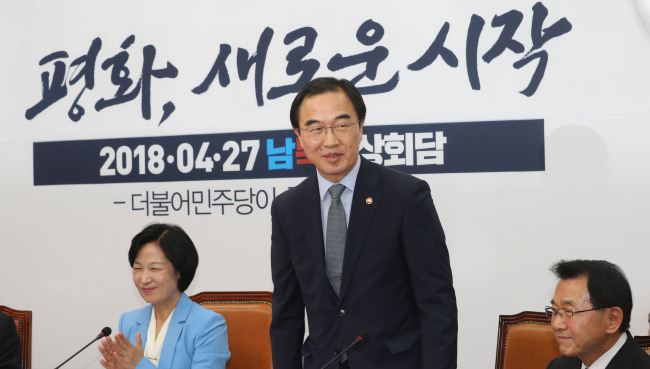Parliamentary ratification of summit declaration emerges as hot-button issue
By YonhapPublished : April 30, 2018 - 13:13
The proposed parliamentary ratification of last week's inter-Korean summit declaration is emerging as a political hot potato, with the main opposition Liberty Korea Party calling it a "disguised peace show" and a political event ahead of the June local elections.
The presidential office Cheong Wa Dae and the ruling Democratic Party have sought the ratification to ensure that the "Panmunjom Declaration" can be enforced under a legal framework and continue to stay effective regardless of a change of government.
The LKP opposes the ratification on the grounds that the declaration lacks specifics, particularly about costly cross-border projects, while some members raised the suspicion that the ruling bloc is seeking to turn the political pendulum in its favor ahead of the local elections.
The presidential office Cheong Wa Dae and the ruling Democratic Party have sought the ratification to ensure that the "Panmunjom Declaration" can be enforced under a legal framework and continue to stay effective regardless of a change of government.
The LKP opposes the ratification on the grounds that the declaration lacks specifics, particularly about costly cross-border projects, while some members raised the suspicion that the ruling bloc is seeking to turn the political pendulum in its favor ahead of the local elections.

In the declaration following the summit between South Korean President Moon Jae-in and North Korean leader Kim Jong-un, they affirmed the shared goal of "complete denuclearization" and agreed to halt all hostile acts against each other as well as to seek a formal end to the 1950-53 Korean War and a peace regime among other things.
The past cross-border summits in 2000 and 2007 produced two declarations underscoring inter-Korean cooperation, exchanges and tension reductions, but the agreements fizzled out following a change of government.
Calls for policy consistency have continued, as Seoul's stance on the communist regime has oscillated between engagement and strict reciprocity, in a stark reminder of intense division among liberals and conservatives.
The ruling party lambasted the LKP for deprecating the summit declaration.
"It appears that the LKP seems to be stuck in the past when it enjoyed (political) gains over security issues," Choo Mi-ae, the party's leader, said during a meeting with senior party officials.
"Now, it is the start of a big journey towards the declaration of a formal end to the Korean War, denuclearization and a peace regime. ... The Democratic Party will prop up efforts to ensure that the historic Panmunjom Declaration will smoothly be enforced."
Woo Won-shik, the party's whip, also made the case for the need to ratify the declaration.
"We have to make sure that the precious fruits (of the summit) and opportunities will not go down the drain," he said.
Lee Jeong-mi, the leader of the minor Justice Party, backed the ruling party.
"If the LKP provokes conflict and confrontation and continues its criticism of the North, it will face a public backlash," she said. "The first task of cooperative politics is to ensure the parliamentary ratification of the Panmunjom Declaration."
But the LKP continued its recriminations.
"Though (the summit declaration) is coated with political rhetoric, it is not like the North dismantled its nuclear arsenal or opened up its door through a policy of reform and openness," Rep. Kim Sung-tae, the LKP floor leader, said during a party meeting.
"We actively welcome the summit, in light of the fact that it marked a new turning point in inter-Korean relations, but we have to remain level-headed until the road map for denuclearization is completed," he added.
LKP leader Hong Joon-pyo also said the party can never accept the agreement.
"The Moon Jae-in government and some media outlets are speaking as if peace has arrived on the Korean Peninsula, but the reality is far from it," Hong told a news conference, adding that the summit was full of surprise events but that none of the fundamental issues were resolved, including the nuclear standoff.
Hong said the summit agreement called for a "complete denuclearization" of the peninsula, but that's far from a commitment by the North to give up its nuclear program. Rather, the expression can be used to prevent the US from deploying strategic assets to the South, he said.
"The results of the inter-Korean summit are no different from voluntarily disarming ourselves," Hong said, adding that the agreement to halt all hostile acts could mean that regular joint military exercises with the US cannot take place.
Declaring an end to the Korean War and replacing the armistice with a peace treaty as well as massive economic cooperation with the North should take place only after the communist nation abandons its nuclear weapons, he said.
Currently, the ruling party, the Party for Democracy and Peace, the Justice Party and several lawmakers of the Bareunmirae Party support the proposal for the parliamentary ratification. Thus political watchers say the ruling party could set up a vote for the ratification motion without the LKP's backing.
But alienating the LKP in the ratification process could trigger greater confrontations over other key legislative issues, including the government's proposal for a supplementary budget and a long-delayed constitutional revision.
The ratification requires approval from a majority of lawmakers present for a floor vote that needs at least half of all 293 lawmakers.
Meanwhile, the parties failed to reach an agreement to normalize the parliament, which has been paralyzed by partisan squabbles over an opinion rigging scandal and other issues.
National Assembly Speaker Chung Sye-kyun and the floor leaders of the four floor negotiation blocs met but merely sparred over conflicting interpretations of the latest inter-Korean declaration and the scandal involving an influential blogger with alleged ties to a key ruling party lawmaker.
The parliament is set to convene another extraordinary session on Wednesday.(Yonhap)



![[Herald Interview] 'Amid aging population, Korea to invite more young professionals from overseas'](http://res.heraldm.com/phpwas/restmb_idxmake.php?idx=644&simg=/content/image/2024/04/24/20240424050844_0.jpg&u=20240424200058)













![[KH Explains] Korean shipbuilding stocks rally: Real growth or bubble?](http://res.heraldm.com/phpwas/restmb_idxmake.php?idx=652&simg=/content/image/2024/04/25/20240425050656_0.jpg&u=)

